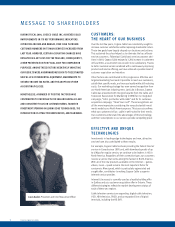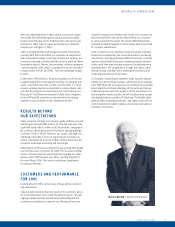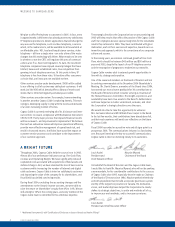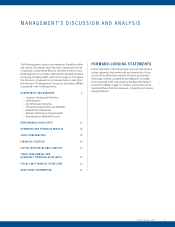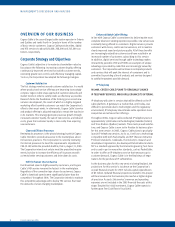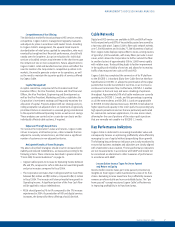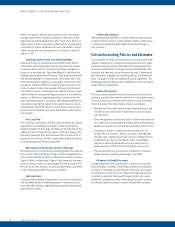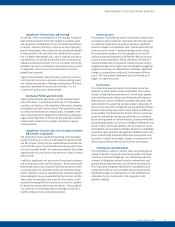Cogeco 2004 Annual Report Download - page 14
Download and view the complete annual report
Please find page 14 of the 2004 Cogeco annual report below. You can navigate through the pages in the report by either clicking on the pages listed below, or by using the keyword search tool below to find specific information within the annual report.
MANAGEMENT’S DISCUSSION AND ANALYSIS
12 Cogeco Cable Inc. 2004
Fiscal 2005
Asset Retirement Obligations
In March 2003, the CICA issued Handbook Section 3110, Asset
Retirement Obligations, which provides guidance for the recogni-
tion, measurement and disclosure of liabilities for asset retirement
obligations and the associated asset retirement costs. The standard
applies to legal obligations associated with the retirement of a
tangible long-lived asset that result from acquisition, construction,
development or normal operations. The standard requires the
Corporation to record the fair value of a liability for an asset retire-
ment obligation in the year in which it is incurred and when a
reasonable estimate of fair value can be made. The standard
describes the fair value of a liability for an asset retirement obli-
gation as the amount at which that liability could be settled in
acurrent transaction between willing parties, that is, other than
in a forced or liquidation transaction. The Corporation is subse-
quently required to allocate that asset retirement cost to the
expense using a systematic and rational method over the asset’s
useful life. The standard applies to fiscal years beginning on or after
January 1, 2004. The Corporation is currently evaluating the impact
of this new standard on the consolidated financial statements.
Variable Interest Entities
In June 2003, the CICA issued Accounting Guideline 15 (“AcG-15”),
Consolidation of Variable Interest Entities, which defines Variable
Interest Entities as entities that have insufficient equity or whose
equity investors lack one or more specified essential characteristics
of a controlling financial interest. The standard provides guidance
for determining when an entity is a Variable Interest Entity and
who, if anyone, should consolidate the Variable Interest Entity.
The Guideline will apply to all annual and interim periods begin-
ning on or after November 1, 2004. The Corporation is currently
evaluating the impact of this new accounting guideline but
its adoption is not expected to have a material impact on the
consolidated financial statements.
Uncertainties and Main Risk Factors
This section outlines general as well as more specific risks to
Cogeco Cable and its subsidiaries, that could significantly affect the
financial condition, operating results or business of the Corporation.
It is not intended to cover all possible contingencies, nor is there
any assurance that the risks outlined in this section will actually
unfold as expected or have the anticipated consequences.
Market Conditions and Competition
Bell Canada, the incumbent telephone company in most of Ontario
and Québec, has applied to the Canadian Radio-television and
Telecommunications Commission (CRTC) for regional licences
in each province to offer broadband video distribution services
over its telephone plant using VDSL (Video Digital Subscriber Line)
technology. This development may result in an additional compet-
itive alternative being made available in the Oakville, Burlington
and Hamilton area where Bell Canada plans to launch its new
VDSL distribution service. Bell Canada’s parent company, BCE,
which also owns the largest DTH (Digital Terminal Home) satellite
distribution undertaking in Canada, Bell ExpressVu, would thus
be in a position to combine the satellite and wireline broadband
operations of its two business units for competitive advantage.
Cogeco Cable has conducted VoIP market trials and intends to
launch wireline telephone services in 2005. Cogeco Cable will be
competing with several new entrants in the residential telephone
market that also use VoIP technology. VoIP telephony will offer
the possibility of more flexible service configurations and lower
costs than traditional switched telephony. However VoIP is rela-
tively new and it remains uncertain whether, and if so at what rate,
customers will chose VoIP as supplemental or as a replacement
to their existing telephone service.
Broadband service bundles typically include attractive intro-
ductory offers and significant discounts to the aggregate retail
price of the individual services comprising the bundle. While the
reference retail prices of individual video distribution and HSI
access services have remained relatively stable during the last
fiscal year, there is no assurance that there will not be increased
discounting or aggressive price competition affecting these services
in the current fiscal year. Bell Canada has recently introduced a
new competitive service bundle that includes deeply discounted
long distance telephone services, a service bundle that Cogeco
Cable cannot presently match on its own.
The market for broadband video distribution is also affected by
the unauthorised reception of encrypted video signals. In order
to keep signal theft under control, both the technical opportunity
and the structural incentives to steal video signals must be
addressed. The black market exploits weaknesses in the techno-
logy and processes used by broadband distributors. Encrypted
signals of certain satellite distributors have been more particularly
targeted by hackers over the last several years, with a resulting
loss of market potential for all legitimate broadband distributors
in Canada, including cable system operators. The black market
segment will likely continue to grow in the absence of improved
anti-piracy legislation and more effective law enforcement in
Canada. Current regulatory restrictions preventing licensed
distributors, including Cogeco Cable, from carrying many non-
Canadian programming services in Canada will likely continue
to fuel demand for black market solutions.


